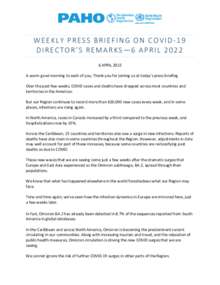Weekly Press Briefing on COVID-19: Director's Opening Remarks, April 6, 2022

|
A warm good morning to each of you. Thank you for joining us at today’s press briefing. Over the past few weeks, COVID cases and deaths have dropped across most countries and territories in the Americas. But our Region continues to record more than 620,000 new cases every week, and in some places, infections are rising again. In North America, cases in Canada increased by a third compared to the previous week, and hospitalizations rose by 10%. Across the Caribbean, 15 countries and territories also saw a surge in new infections. Reports of deaths have also risen in some countries throughout the Region. However, adjustments in data may well account for part of these increases, because some countries are reclassifying past deaths as due to COVID. These new waves that we are seeing come just a few weeks after the dramatic surges that Europe and East Asia experienced as the Omicron sublineage, BA.2, spread through their populations. We know that what has happened elsewhere in the world foreshadows what our Region may face. Time and time again, we’ve seen how the infection dynamics in Europe are mirrored here, just a few weeks later. In fact, Omicron BA.2 has already been detected in 8.7% of the sequences reported from South America in global databases. In the Caribbean and across North America, Omicron is becoming the predominant variant circulating in our communities. Along with increasing tourism and travel, and the relaxation of public health measures, Omicron circulation is driving the new COVID surges that we are seeing. We cannot ignore the risk of further COVID-19 surges in other parts of the Region. We must face it together, with caution, but also with confidence because we know what it takes to protect our people. First, it is important to continue filling our vaccination gaps to protect the most vulnerable. The elderly and immunocompromised remain the people most likely to be hospitalized following COVID infection. Omicron has made it crystal clear that vaccines are our best bet to protect them, and everyone else, from severe disease and save lives. More than 685 million people in our Region have completed their COVID vaccination schedules. And 50 countries and territories have already begun to deliver additional doses and booster shots to their eligible populations. The addition of this booster dose to the primary series is key for people at higher risk for severe COVID, who may need an additional dose to remain as protected as everyone else. But the gaps that still exist will keep our Region at risk during future waves. Despite all of our efforts, and efforts of Member States, 240 million people in the Americas have yet to get a single shot of COVID vaccine. We have secured the necessary vaccine supplies. Now, we need to redouble our efforts to ensure that our vulnerable populations receive the doses that they need to remain protected against COVID-19, and we need to do that as soon as possible. Countries must also continue to monitor this virus to stay prepared for what is coming next. Throughout the pandemic, testing has been a critical tool to track COVID’s spread. But today, some countries have changed their testing strategies, making it more difficult to get the full picture of BA.2 in our Region. Countries must keep testing capacity in place, so we do not go into this next wave blind. This means making tests easily accessible for everyone everywhere, to prevent new outbreaks and to prepare our health systems if cases surge. And the third and final priority is for countries to continue to make evidence-based decisions. Over the last few weeks, many countries and territories in the Americas have scaled back public health measures, and some have done so prematurely. As travel restrictions have loosened, case counts have risen in places that rely on tourism, especially in parts of North America and the Caribbean where vaccination coverage is low. It is important to continue to rely on data as our eyes and ears into this pandemic. And just as we did before, we must adjust our strategies when cases rise, to save lives. Tomorrow, as we celebrate World Health Day and this year’s theme of “Our Planet, Our Health,” we wish to make an urgent call to work together towards a healthier, more sustainable future, so that we can withstand this next phase of the pandemic, and other health crises. It is undeniable that climate change has presented significant threats to our Region’s health. Higher temperatures and air pollution have led to rises in cardiovascular and respiratory diseases in the Americas. Extreme weather events, droughts and wildfires have caused crop failures and displaced people from their homes, driving malnutrition and forced migration. Our health systems are also at risk, as too many of our hospitals were built in places vulnerable to floods, hurricanes, landslides, and other extreme events. We are working to address this throughout the Region, but we all need to move faster. Health system resilience is not just a necessity to overcome COVID, it is an investment for our future. As we prepare for the next emergency, we are counting on countries across the Americas to continue making health their collective priority. |
